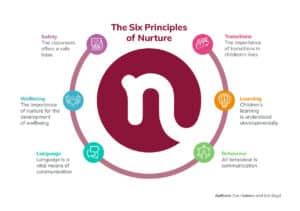Across the UK, we’re seeing a dramatic spike in anxiety and absentee levels due to the impact of Covid-19 and broader socio-economic challenges. Severe absence has soared by 134% when compared to pre-pandemic levels, and more than a quarter of all children now regularly miss school. We know that 75% of children and young people who experience mental health problems aren’t getting the help they need and this makes it incredibly hard to give them the education they deserve.
But there are proven ways to tackle this crisis, and increasing numbers of schools are turning to nurture interventions to help.
Nurture groups are small groups of six to 12 children, usually based in a mainstream setting. They are designed to address the social and emotional needs that can hamper pupils’ learning by providing them with the opportunity to build resilience, understand and regulate their emotions, develop essential social skills, and engage with the curriculum. As well as providing academic teaching, nurture groups help children to develop confidence and self-respect, and to take pride in behaving well and achieving.
They are designed as a short term, part-time, focused intervention where children remain part of their own class group, and usually return full-time within four terms. The groups are based on the Six Principles of Nurture, which underpin the curriculum, context, theory and organisation of the intervention.

The inclusive and supportive nature of the group, which is led by two members of staff, helps children to feel safe and secure. The nurture staff engage with each child through a clear and predictable daily routine that includes emotional literacy sessions, news-sharing, group activities, curriculum tasks and nurture snack time.
The friendly, supportive relationship between the two members of staff is also itself an important source of learning – a model for the pupils to observe and copy. Once the children are settled into the daily routine of the nurture group, their mainstream class teacher can be invited to join the children in the room for an activity such as snack time. By doing this, pupils see the two settings as one, ensuring consistency and security for the child, encouraging positive outcomes.
Nurture groups do not work in isolation, and it is vital that all staff understand the purpose of the intervention. Senior leaders should treat the nurture group as they would any other class, with regular assessment and progress meetings. The nurture group curriculum is inclusive, often play-based, and represents activities and learning that help the pupils’ to improve skills such as speaking and listening, dealing with anger, building trusting relationships, and developing empathy.
The intervention seeks to combine the worlds of home and school for the child. Family and school are two influential systems in a child’s development and the idea that they are connected is particularly important to nurture practitioners for a joined-up approach to addressing difficulties. Nurture practitioners need to communicate openly with parents and carers so that they are fully informed about the nurture group principles and expected outcomes. As time progresses, parents and carers are invited in for sessions and activities with their child, thus building trusting relationships with parents and carers in the same way as they do with the nurture group pupils themselves.
Nurture groups provide children and young people who are struggling to access education in the classroom a safe environment to develop skills that help them be able to learn. They are just one of the interventions on the graduated approach to nurture that ensures every child has access to the support they need, when they need it.
If you’re interested in creating a nurture group for your setting, or learning more of the theory behind the approach, please visit our website. Our three-day certified Theory and Practice of Nurture Groups course equips staff with the practical skills needed to set up and run a group, whilst also providing a deeper understanding of the theory behind the intervention, and research on the developing brain and neuroscience.

